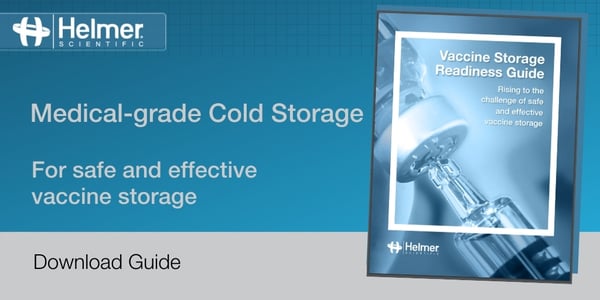
Since the start of the COVID-19 pandemic, there have been several news headlines regarding spoiled COVID-19 vaccines due to temperature control issues or equipment failures. Improper storage and handling of vaccines can reduce vaccine potency and even result in the need to revaccinate patients. Vaccine waste can lead to a significant financial impact for the provider. While storage and handling errors are not new, the COVID-19 pandemic and vaccine rollout has put a spotlight on the importance of safeguarding critical vaccine product.
With varying state requirements for reporting vaccine waste, it’s difficult to calculate how much vaccines are wasted each year in the U.S. or even the financial consequences associated with vaccine waste. Based on reported cases, vaccine loss due to improper storage costs states over $3 million a year. Per facility, this could be anywhere between $15,000 and $75,000 a year.
Since a 2010 study by the Department of Health and Human Services confirmed that vaccine stored by 76% of providers was stored at inappropriate and unsafe temperatures, the CDC has enhanced recommendations for safe storage and administration of vaccines. Their Vaccine Storage and Handling Toolkit is updated periodically to include the most up to date best practices for storing, handling, and administering vaccines.
To protect your facility and prevent vaccine loss the CDC recommends:
- Providers store vaccines at manufacturer recommended temperatures to maintain efficacy
- The use of purpose-built or medical grade units specifically designed to store vaccines
- Appropriate vaccine storage for maximum expected doses to prevent overloading vaccine storage units
- Temperature monitoring using a digital data logger (DDL) to ensure cold chain stability
Unlike house-hold or non-medical grade units, purpose-built or medical-grade units are specifically designed to store medications, vaccines, blood products and patient samples. These units meet CDC recommendations and can help prevent costly temperature excursions through temperature uniformity, recovery, and stability.
In addition to the CDC recommendations, a Joint Committee for Vaccine Storage was stood up through NSF (National Sanitation Foundation) to outline performance standards for vaccine storage. This committee is comprised of a diverse group of stakeholders representing public health (including the CDC), regulatory bodies, providers, vaccine suppliers and equipment manufacturers. The committee has been working to create a standard for vaccine refrigeration engineering controls to help ensure vaccines are stored safely under real-world conditions. Testing protocols in this draft standard include:
- Steady-state evaluations
- Short duration door opening evaluations
- Long duration door opening evaluations
This new standard is expected to be finalized and adopted across the industry sometime in 2021.
By choosing a medical-grade vaccine storage unit, facilities can eliminate costly temperature excursions, maximize patient vaccination rate, reduce vaccine waste, save time and money. Helmer’s GX Solutions line of vaccine refrigerators and freezers meet CDC guidelines and emerging NSF standards for vaccine storage.
OTHER BLOGS YOU MIGHT BE INTERESTED IN...
- GX Solutions: Why You Need Professional, Medical-grade Cold Storage
- Vaccine Storage Safety and the Importance of Routine Maintenance
- Rising to the challenge to support COVID-19 vaccine cold storage
- Join Us For Our Upcoming Webinar. COVID-19 One Year Later: Vaccine Progress and New Standards for Storage
Vaccine storage demand continues, and Helmer is ready to rise to the challenge and provide your facility vaccine storage solutions to safeguard vaccine product. Download our Vaccine Readiness Guide to learn more about safe and effective vaccine storage.




